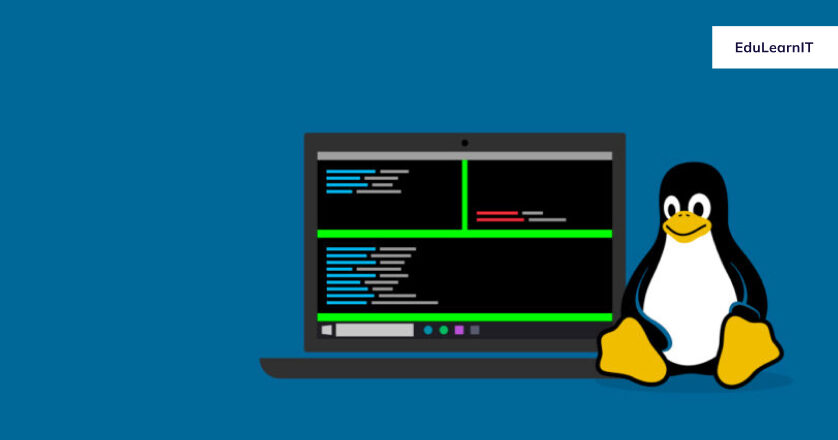Date | Days | Time | Batch Size |
JUL 11th | MON - FRI (15 Days) | 08:30 PM to 10:30 PM (IST) | 50 |
JUL 11th | MON - FRI (15 Days) | 08:30 PM to 10:30 PM (IST) | 50 |
JUL 11th | MON - FRI (15 Days) | 08:30 PM to 10:30 PM (IST) | 50 |
JUL 11th | MON - FRI (15 Days) | 08:30 PM to 10:30 PM (IST) | 50 |
Linux Fundamentals & Shell Scripting

EduLearnIT’s Linux Fundamentals Certification Course will help you gain a strong foundation in Linux from scratch. This course will help you master important Linux concepts such as Linux installations, Packages, Architecture, File System, User Management, Scripting Data & various useful commands and utilities with sufficient hands-on. This Linux Fundamentals certification course is also a gateway towards Linux Kernel, Linux Administration and Linux programming.
Curriculum
Learning Objective: In this module, you will be introduced to various features of Linux. You will learn history, open source licences, various Linux distributions and Linux installation.
- Need for Linux OS
- What is Linux
- History of Linux
- Relationship Between Unix And Linux
- Features of Linux
- False myths around Linux
- Where Linux is used?
- Components of a Linux OS
- The architecture of Linux OS
- Types of Kernel
- Shell
- Programming in Linux
- Linux Distribution
- Miscellaneous Linux Concepts
- Software Licencing
- Installation and initialisation of Linux
- Shell Scripting
- Practical Uses of Shell Scripting
Learning Objective: In this module, you will understand the user interface, commands and tools, and file operations in Linux
- Understand User Interface in Linux
- Implement basic Linux Commands and Tools
- vim Editor
- Advanced Linux Commands
- File System
- File System Comparisons
- File Attributes
- File Operations
- File System Characteristics
- File Access Methods
- Formatting and Partitioning
- Multiboot System
- Learn Packaging Management in Linux
- Hands On/Demo:
- Linux Commands
- Vim Editor
- Creating partitions
Learning Objective: In this module, you will learn about managing Users and perform Authentication Configuration
- Users in Linux
- User Configuration
- Adding/Deleting/Modifying Users
- Group Administration
- Password Aging Policies
- Switching Accounts
- Sudo
- Network Users
- Authentication Configuration
- SUID and SGID Executable
- SGID Directories
- The Sticky Bit
- Default File Permissions
- Access Control Lists (ACLs)
- Hidden Files
- Hands On/Demo:
- Demo – sudo, chown and chmod
- Adding a user
- Delete user
- Modify user
- Hidden Files
Learning Objective: In this module, you will learn about the boot management system and configuring services to run at boot. You will understand package management, which includes installing and removing software and updating a Kernel RPM.
- Kernel Configuration
- Boot Management
- Grub Bootloader Configurations
- Red Hat Package Manager
- YUM
- DPKG
- APT
- Build from the source code
- Libraries
- Hands On/Demo:
- Sysctl
- Bootloader Configurations
- Red Hat Package Manager
- YUM
- DPKG
- APT
Learning Objective: In this module, you will learn about OSI layers and various protocols of networking in Linux
- OSI layers and Protocols: IPv4, IPv6, TCP, UDP, FTP, TFTP, Telnet, SSH, HTTP, DNS, DHCP, ARP,
- ICMP etc.
- Packet capturing tools
- Linux commands/tools to troubleshoot networking: netstat, tcpdump, ip, etc.
- Linux utilities: e.g. dnsmasqd, samba server ftpd, webserver, netcat, scp etc.
- Linux Firewall: command, utility and usage.
- Security: SSH, SCP. Certificates, authentication, encryption etc.
- Remote log in: SSH, screen, VNC, etc.
- Hands On/Demo:
- IP addresses
- DNS
- ICMP
- dnsmasq.conf
- IP tables
Learning Objective: In this module, you will learn process management, system calls and bash operations.
- Process Management
- Process Commands
- System Calls
- Output Redirection
- Special Variables in Bash
- Expect Script
- Python Scripting
- Dictionaries
- Hands On/Demo:
- Ps command
- Top command
- Kill command
- Expect
Learning Objective: In this module, you will learn about programming languages, libraries and profiling tools.
- Programming languages overview
- Static and Shared libraries
- Compilers, debugger, IDE, ctags, make utility etc.
- Editors in Linux: vi, emacs,
- Troubleshooting and optimization using profiling tools
- Diff, patch and Configuration management system
- Test automation and CI/CD pipeline
- Hands On/Demo:
- Libraries
- Makefile
Learning Objective: In this module, we will learn about Linux security administration and Virtualization.
- Security in IT Industry
- SELinux
- Information gathering tools
- Grub security
- TCP Wrappers
- Securing Shell
- ClamAV
- Virtualization
Required Content.
